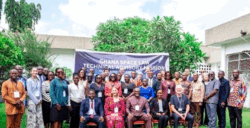Chief Executive Officer of the Chamber of Agribusiness Ghana (CAG), Anthony Morrison, has called on bee-keepers to desist from practicing outmoded methods of production and institute proper structures to develop the industry.
According to Mr. Morrison, the industry must not only concentrate on producing bees but also adopt modern practices that will help them increase production while maintaining quality.
“There are a lot of bee-keepers who are only interested in producing honey. However what critical decisions and steps they need to put in place like financial training, management training, food safety and various others are not in existence. We cannot keep on doing what we have been doing since 100 years ago and expect good results in the industry,” he said.
Giving remarks at the launch of ‘Make Ghana’s Honey Fit for Export project’ – an initiative to train bee-keepers across the country on proper ways of keeping bees for mass production – Mr. Morrison stated that the honey industry is not properly harmonised, stating that there have not been commitments and better policies from government.
Thus, he advised, the industry must rise and put in place proper structures and policies which will drive it along the right path to take advantage of the market, saying: “The only way the private sector can move is when it finds a way of regulating its own activities and designing an investment pathway. We need to sell this industry ourselves”.
He urged other stakeholders to support the project and contribute to the industry’s sustainability by bringing it under a proper investment purview that can translate into success.
The Project
According to Research Scientist and Coordinator for the project, Dr. Courage Besa-Adanu, the project is meant to provide training for bee-keepers across the country on proper ways of keeping bees so as to produce honey that can meet the premium market demand.
He added that the training will help sensitise and structure the industry in order for it to stand out and do away with bad reputations surrounding honey production in the country.
“We have to be able to define the analysis, and in defining it you have to know which trees the bees visited. You need to know what the characteristics of the honey are – in terms of appearance, how it flows and the chemical composition,” he said.
President for the Ghana Bee Keepers Association, Patrick Addo Newman, indicated the project will help address challenges of the industry: saying the association will adhere to all instructions and training that will be given to them.
“This project is going to train us on how to improve upon production levels, how to maintain quality harvesting practices and systems. This project will help us expand production, and as well help do away with the fear in the system,” he said.










